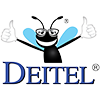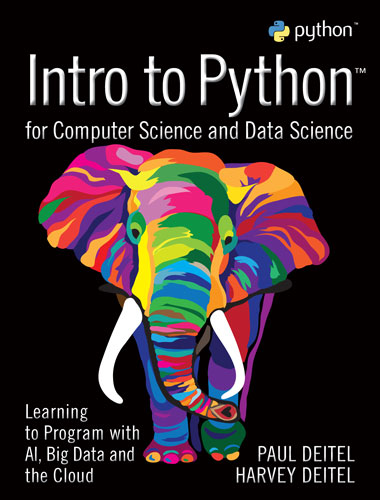Python for Programmers
Instructor-Led Training with Paul DeitelIntended for programmers with a background in another high-level language and based on our innovative new textbook Intro to Python for Computer Science and Data Science, this course provides a code-intensive presentation of Python—one of the world’s most popular and fastest-growing languages.
In the context of scores of real-world code examples ranging from code snippets to large scripts, attendees will write Python code using the interactive IPython interpreter and Jupyter Notebooks. Via extensive hands-on labs, attendees quickly will become familiar with the Python programming idioms, key Python Standard Library modules and additional open-source libraries.
After taking this class, you’ll be prepared to take Data Science and AI for Python Programmers, which introduces today’s most compelling, leading-edge data science, AI and big data computing technologies, including Natural Language Processing, Data Mining Twitter®, IBM Watson® and Cognitive Computing, Machine Learning, Deep Learning, and Big Data: Hadoop®, Spark™, NoSQL and IoT.
Key Topics
- Test Drives—Interactive Python coding in IPython and Jupyter Notebooks
- Introduction to Python Programming—Variables; Operators; Function print; Single-, Double and Triple-Quoted Strings; Function input; Objects and Dynamic Typing
- Control Statements—
if;if…else;if…elif…else;while;for; Function range; Augmented Assignments; Formatted Strings; TypeDecimalfor Monetary Amounts;break;continue; Boolean Operators - Functions—Function Definitions; Random-Number Generation; Python Standard Library;
mathModule; IPython Tab Completion for Discovery; Default Parameter Values; Keyword Arguments; Arbitrary Argument Lists; Methods; Scope Rules;import - Sequences: Lists and Tuples—Lists; Tuples; Unpacking Sequences; Sequence Slicing;
delStatement; Sorting Lists; Searching Sequences; List Methods; Functional-Style Programming with List Comprehensions, Generator Expressions, Filter, Map and Reduce; Two-Dimensional Lists; Intro to Simulation and Static Visualization with Matplotlib and Seaborn - Dictionaries and Sets—Creating a Dictionary; Iterating through a Dictionary; Basic Dictionary Operations; Dictionary Methods; Dictionary Comparisons; Example: Dictionary of Student Grades; Example: Word Counts; Dictionary Comprehensions; Sets; Intro to Dynamic Visualization with Matplotlib FuncAnimation
- Array-Oriented Programming with NumPy—Creating
arrays;arrayAttributes; List vs.arrayPerformance: Introducing%timeit;arrayOperators; NumPy Calculation Methods; NumPy Universal Functions; Indexing and Slicing; Shallow vs. Deep Copy; Reshaping and Transposing - Strings: A Deeper Look—Formatting Strings; Concatenating and Repeating Strings; Stripping Whitespace; Changing Character Case; Comparing Strings; Searching for Substrings; Replacing Substrings; Splitting and Joining Strings; Characters and Character-Testing Methods; Raw Strings; Introduction to Regular Expressions
- Files and Exceptions—Text-File Processing; Serialization with JSON; Working with CSV Files; Handling Exceptions;
finallyClause; Explicitly Raising an Exception; Stack Unwinding and Tracebacks - Object-Oriented Programming—Custom Class Definitions; Controlling Access to Attributes; Properties for Data Access; Simulating “Private” Attributes; Case Study: Card Shuffling and Dealing Simulation; Inheritance: Base Classes and Subclasses; Building an Inheritance Hierarchy; Polymorphism; Duck Typing; Operator Overloading ; Named Tuples; Python 3.7’s New Data Classes; Unit Testing with Docstrings and
doctest; Namespaces and Scopes
Intended Audience
- Programmers who don’t know Python, but currently program in a C-based object-oriented language (such as, Java, C++, C#, Objective-C, Swift) and want a fast-paced introduction to Python for programmers.
- People who took a college-level or professional Python course or programmed in Python a while back and want to quickly refresh their Python skills.
- Programmers using a limited range of Python features who would like to see what other features are available.
- Managers considering moving their teams to Python.
- R programmerswhose organizations are considering Python and who want a code-intensive introduction to Python.
Instructor
Paul J. Deitel, CEO and Chief Technical Officer of Deitel & Associates, Inc., is an MIT graduate with 38 years of experience in computing. Paul is one of the world’s most experienced programming-languages trainers, having taught professional courses to software developers since 1992.



Share This Page